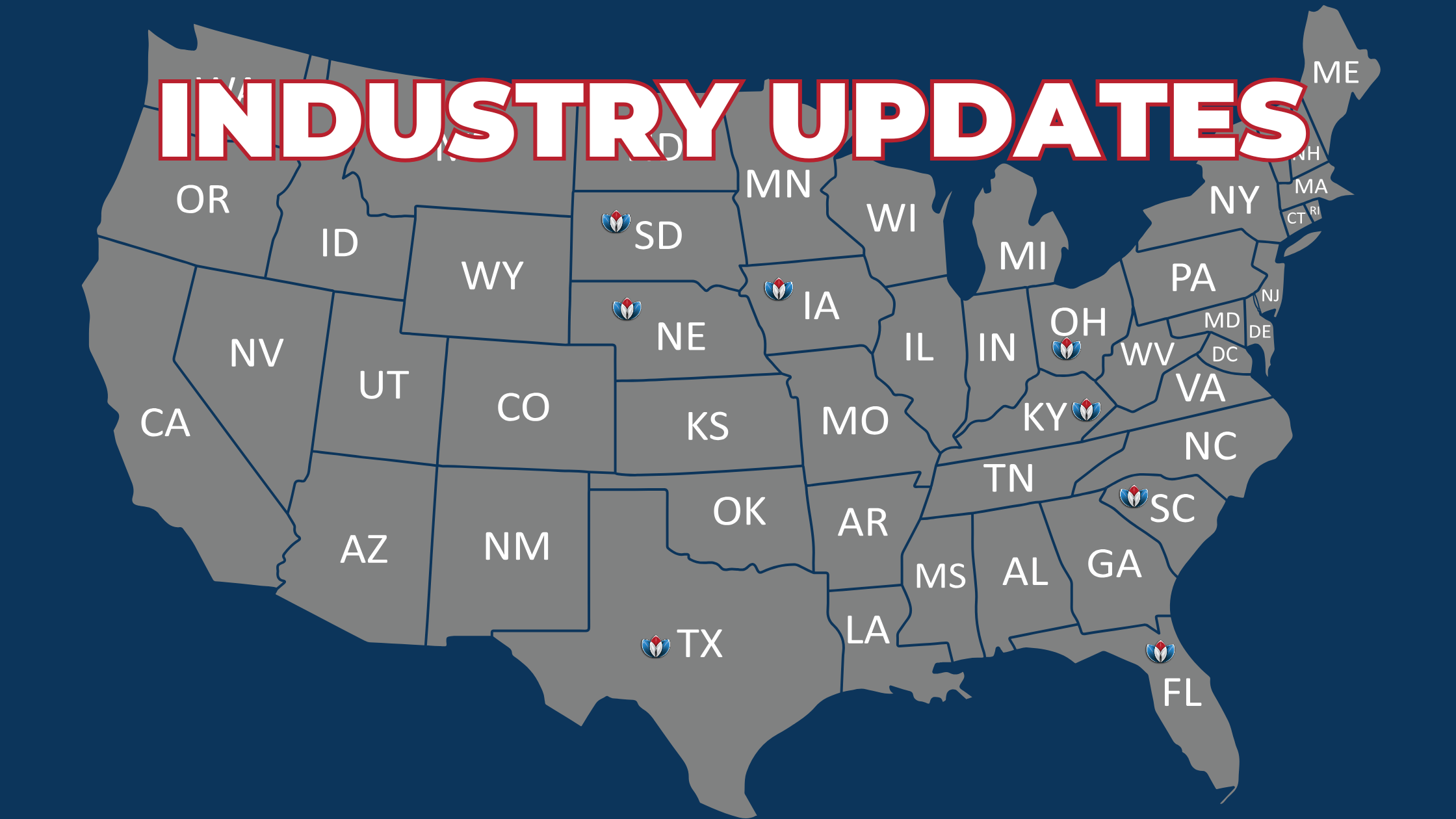
Hemp Legislation Updates Across the U.S.: What You Need to Know
In recent years, the hemp industry has been a focal point of legislative action across the United States. States are taking steps to refine their regulatory frameworks for hemp-derived products, often resulting in significant changes to how these products are produced, sold, and consumed. This blog explores recent updates to hemp laws in Florida, Ohio, Nebraska, South Dakota, Kentucky, Iowa, Texas, and South Carolina. If you're a farmer, business owner, or consumer of hemp products, here's what you need to know.
Florida: New THC Limits Could Change the Market
In Florida, Senate Bill 334 (SB 334) is making waves in the hemp community. The proposed bill seeks to impose new limits on THC levels in hemp products, capping them at 2 milligrams per serving and 20 milligrams per container. For context, full-spectrum hemp products typically contain small amounts of THC to enhance their effectiveness through the "entourage effect."
If passed, SB 334 could dramatically reduce the availability of full-spectrum hemp products. These limits may force manufacturers to reformulate or withdraw popular products from the Florida market altogether. Advocacy groups, including the U.S. Hemp Roundtable, are pushing back, urging residents to contact their legislators and voice concerns about the potential impact on businesses and consumers alike.
Ohio: Stricter Regulation for Hemp Products on the Horizon
Ohio's Senate Bill 86 (SB 86) introduces a stricter approach to hemp regulation by targeting "intoxicating" hemp products. Under the bill, products containing more than 0.5 milligrams of delta-9 THC per serving or more than 2 milligrams per package would be classified as intoxicating and subject to control under the state’s medical dispensary system.
This change could disrupt the availability of hemp products in both retail and online markets. Businesses may face restrictions on selling directly to consumers through e-commerce platforms, limiting access for people who rely on online purchases. With these challenges in mind, many in Ohio’s hemp industry are advocating for more balanced regulations.
Nebraska: CBD Products Caught in Regulatory Crossfire
In Nebraska, Legislative Bill 316 (LB 316) has raised concerns within the hemp industry. While initially seen as a positive step, the bill ties hemp-derived CBD products to federal regulations under the Food, Drug, and Cosmetic Act. This presents a problem since the FDA has yet to formally approve CBD as a dietary supplement or food additive.
As a result, LB 316 could inadvertently ban certain CBD products in Nebraska, despite their legality under the 2018 Farm Bill. Businesses may face compliance challenges, and consumers could lose access to popular wellness products. This regulatory uncertainty highlights the ongoing struggle to align state and federal hemp laws.
South Dakota: Expanding Hemp Opportunities
On a more positive note, South Dakota is making strides with House Bill 1116 (HB 1116). This legislation aims to legalize the use of hemp-derived balms, lotions, and other products for animals. By expanding the legal uses of hemp, South Dakota is creating new opportunities for farmers and entrepreneurs to enter the market.
This forward-thinking approach has the potential to boost the state's agricultural sector and encourage innovation in hemp product development. Farmers, particularly those in rural areas, may benefit from the added demand for hemp-based animal care products.
Kentucky: Clarifying THC Limits for Public Safety
Kentucky has introduced House Bill 34 (HB 34) to address THC levels and driving safety. The bill sets legal THC concentration limits for drivers, similar to alcohol limits, to prevent impaired driving. However, there is concern about whether these limits accurately reflect scientific evidence, as THC can remain in the bloodstream long after its effects have worn off.
Balancing public safety with fair, science-based regulations is essential. Advocates are calling for more research and thoughtful legislation to ensure that the law does not unfairly penalize drivers who use legal hemp products.
Iowa: Expanding Access to Medical Cannabidiol
In Iowa, House File 105 (HF 105) expands the forms of medical cannabidiol available to patients. This move recognizes the importance of offering various consumption options, such as capsules and topicals, to meet diverse patient needs. The change may also pave the way for increased acceptance of hemp-derived CBD products in both medical and retail markets.
For patients seeking natural alternatives, Iowa's legislation offers hope for broader access to hemp-based therapies. As the state continues to refine its laws, the medical community and hemp advocates are watching closely.
Texas: Monitoring for Future Developments
Texas has a complex relationship with hemp legislation. While the state has legalized hemp farming, recent proposals suggest that further regulation may be on the horizon. Advocates are keeping a close eye on developments to ensure that new laws do not stifle the growth of the industry.
Businesses and consumers in Texas should stay informed about potential changes and participate in discussions about hemp policy. With its vast agricultural resources, Texas has significant potential to lead in the hemp industry if regulatory hurdles can be addressed.
South Carolina: Balancing Business Growth and Regulation
In South Carolina, lawmakers are evaluating how best to support the state’s hemp industry while ensuring public safety. Existing laws have enabled growth in hemp farming, but new proposals aim to refine product standards and distribution methods. As legislation evolves, farmers and businesses are working to shape policies that promote both safety and economic development.
Federal Oversight and State Collaboration
A common theme across all these legislative updates is the interplay between federal and state regulations. The U.S. Department of Agriculture (USDA) and the Food and Drug Administration (FDA) continue to influence state policies on hemp. However, conflicting guidance and regulatory gaps create challenges for states trying to establish clear and consistent laws.
Advocates are pushing for greater federal support to clarify the legal status of hemp-derived products, particularly CBD. Collaboration between state and federal governments is essential to create a regulatory environment that supports innovation and protects consumers.
Economic and Public Health Implications
The economic potential of hemp cannot be overstated. States with supportive legislation are seeing growth in farming, manufacturing, and retail sectors. However, ensuring product safety and quality remains a top priority. Regulatory bodies must strike a balance between encouraging industry growth and protecting public health by preventing the sale of unsafe or misleading products.
Advocacy and Legal Challenges
Organizations like the U.S. Hemp Roundtable play a crucial role in shaping policy through advocacy and education. Grassroots movements and industry stakeholders are also vital in raising awareness and influencing lawmakers. At the same time, legal challenges in various states continue to test the limits of existing regulations, underscoring the need for comprehensive reform.
Looking Ahead: The Future of Hemp Legislation
The road ahead for hemp legislation is full of possibilities. States are expected to refine their policies as they learn from the experiences of early adopters. Emerging issues, such as the regulation of minor cannabinoids like delta-8 THC, will likely shape future legislative debates.
Staying informed and engaged is essential for anyone involved in the hemp industry. By advocating for fair and sensible regulations, stakeholders can help ensure that hemp continues to thrive in the United States.



